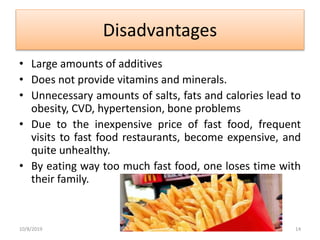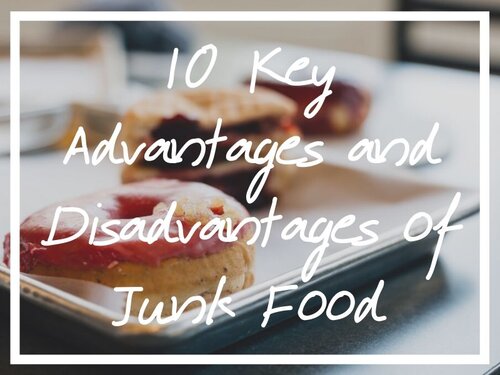Eating junk food can have numerous negative effects on an individual's health and well-being. These effects can range from short-term consequences such as weight gain and increased risk of illness, to long-term consequences such as the development of chronic conditions and decreased overall quality of life. In this essay, we will explore some of the main disadvantages of eating junk food and the ways in which it can negatively impact an individual's health and well-being.
One of the most significant disadvantages of eating junk food is the impact it can have on an individual's weight and overall body composition. Junk food is typically high in calories, fat, and sugar, but low in nutrients such as vitamins, minerals, and fiber. As a result, consuming large amounts of junk food can lead to weight gain and obesity. Being overweight or obese can increase an individual's risk of developing a range of health problems, including heart disease, diabetes, and certain cancers.
Another disadvantage of eating junk food is that it can lead to nutrient deficiencies. Junk food is often lacking in essential nutrients such as vitamins, minerals, and fiber, which are important for maintaining good health. Consuming a diet that is high in junk food and low in nutrient-rich foods can lead to deficiencies in these essential nutrients, which can have a range of negative consequences for an individual's health. For example, a deficiency in certain vitamins and minerals can weaken the immune system, making an individual more susceptible to illness.
In addition to the short-term negative effects on an individual's health, eating junk food can also have long-term consequences. Consuming a diet high in junk food can increase the risk of developing chronic conditions such as heart disease, diabetes, and certain cancers. These conditions can have a significant impact on an individual's quality of life and can even be life-threatening.
Eating junk food can also have negative effects on an individual's mental health. Research has shown that a diet high in junk food is associated with an increased risk of depression and anxiety. This may be due to the fact that junk food is often high in sugar, which can cause blood sugar spikes and crashes, leading to mood fluctuations. Additionally, consuming large amounts of junk food can lead to feelings of guilt and shame, which can contribute to negative mental health outcomes.
In conclusion, the disadvantages of eating junk food are numerous and can have serious consequences for an individual's health and well-being. From short-term effects such as weight gain and nutrient deficiencies, to long-term consequences such as the development of chronic conditions and negative mental health outcomes, the consumption of junk food should be minimized in order to promote good health and well-being.









